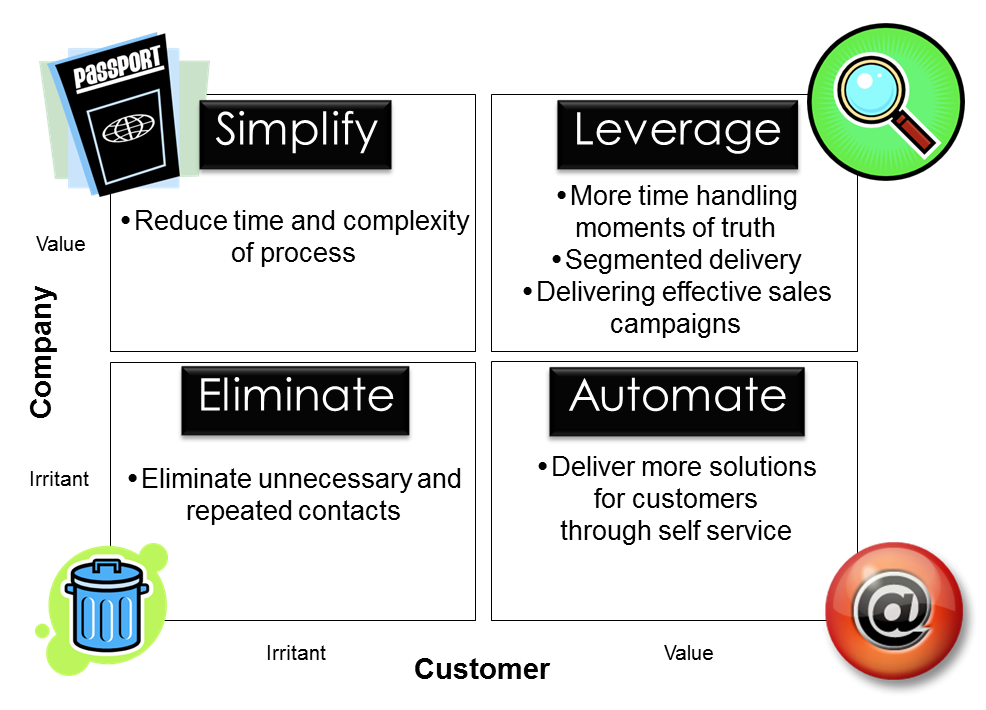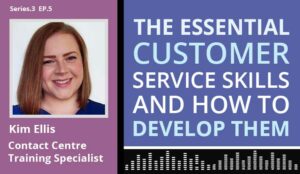Orit Avital introduces us to ten skills that every good contact centre manager will likely possess, before explaining why they are so important.
Managerial skills are not qualities that you either have or don’t have, there is always a next level of development. Luckily, the contact centre allows and requires you to constantly demonstrate these skills and improve them.
So, you should be developing the following ten skills all of the time. We have divided them into two key areas: ongoing and progressive management.
Essential Skills for Ongoing Management
1. The Ability to Think Ahead
There will always be problems, malfunctions, complex situations and moments of crisis in the contact centre. The real issue is not only to find solutions for the problem, but also to devise future preventive methods.
Start by thinking of the desired result and not the problem, then go from there. If you have to put a quick solution to the problem in place first, don’t forget about it soon after and wait for the problem to reappear – a good manager will plan for the future.
It’s easy to think about the initial result and then get drawn back into our usual routines. Approaching the issue by instead asking ourselves “what is our desired reality?” is a much more sustainable tactic.
It’s easy to think about the initial result and then get drawn back into our usual routines. Approaching the issue by instead asking ourselves “what is our desired reality?” is a much more sustainable tactic.
2. The Ability to Manage Time
Sounds clear and logical and requires no elaboration. In practice, reality says otherwise.
While we sometimes have to prioritise our workload, it takes time to do this logically – time that we don’t have. So, we deal with what’s the most urgent and easy problem to fix first, such is human nature. However, this means that we’re not focused on continuously improvement.
So, we have to prioritise and delegate where possible, and one tool for doing this is by inserting all of our tasks into the “Value Irritant Grid”, as found below.

Find out more about how to use this grid in our article: A Simple Technique to Improve Your Contact Centre Strategy
Alongside this, also try to change how you think about time. For example, don’t think: “I do not have time!”, think: “I have a lot of tasks!”
Why is this important? Because time is not a resource that you have control over, beyond what you have in a day. Instead, tasks are within your control and can be delegated, automated or, if they are of little value, eliminated.
3. The Ability to Train and Develop Those Reporting to You
A manager must also be a trainer, a coach and often a mentor. You must invest time and effort in strengthening and developing the team reporting to you, otherwise your management will be narrow and often misguided.
When this happens, you will find yourself drowning in the management of tasks and you will lose touch with what’s actually happening in the contact centre.
So, build a development plan for people reporting to you, provide them with regular, open feedback which allows them to examine their development themselves. Invest in the development of their independent coping ability, while guiding them during work.
A contact centre manager must be people oriented in order to fulfil every task!
4. The Ability to Motivate and Engage the Team
A manager holds authority and ability to influence, but only if they understand that they cannot substantially change anything on their own and that the team under them (and sometimes alongside them) are their “channels of operation”.
So, it’s important to invest in motivation and engagement on a regular basis, which is a central component for optimal management of the contact centre.
Be sure to engage the team with a purpose, so their work has meaning. This will then fill them with the enthusiasm to work hard. If you ensure that you recognise this hard work, motivation will renew.
While teambuilding and fun activities can be great to motivate team leaders and other managers, a wider plan is needed to engage those reporting to you also on a regular basis.
But, first be sure to engage the team with a purpose, so their work has meaning. This will then fill them with the enthusiasm to work hard. If you ensure that you recognise this hard work, motivation will be renewed – so remember to consistently praise hard work.
5. The Ability to Relay Messages and Handle Conflict
As advanced as your contact centre may be, humans are the fabric of it, which means conflicts can occur. It is the job of the manager to provide a fair response and neutralise any negativity, when such conflicts arise.
But it’s easier to plan to avoid the conflict in the first place, so get to know your team and learn to pick up on the signs of when someone is agitated.

It’s easier to plan to avoid the conflict in the first place, so get to know your team and learn to pick up on the signs of when someone is agitated.
Also, when you assign tasks to a group of people, ensure that they are of the same “personality-type” to help avoid hearing things such as “He’s always in meetings, I never see him doing any work” or “why is she sending these emails at the end of the day?” These comments should ring the alarm bells!
When you sense conflict, be proactive by having a quick chat with those involved and managing the situation. If you don’t do this, the team will question your “emotional management”, which will only serve to aggravate the situation.
Take a standpoint, be involved managers. Learn and define your expectations regarding conflict management methods and see that slowly and surely your people will learn how to operate differently.
For more tips on handling conflict, read this article on 10 Tips for Being a More Courageous Contact Centre Manager.
Essential Skills for Progressive Management
6. The Ability to Create a Process Vision
A good manager will know where they want the contact centre to be in five or ten years’ time. They will have a “process vision” for how to meet their targets and have a gauge for what their success looks like.
To create this vision, a contact centre manager will:
- Know and understand the underlying significance of existing problems
- Know how to find the source of each problem and characterise it
- Set long-term objectives
- Fundamentally and thoroughly plan a process of change, taking into account risk factors and stakeholders
- Perfect their plans as they go, keeping the long-term objectives in mind
As the manager, it is key to align your contact centre processes with your vision, which should be linked to wider organisational skills. So, being analytical is key, as you can assess future trends and create this process vision.
7. The Ability to Be Flexible
In a matter a moments, the atmosphere in the contact centre can change and managers find themselves with their hands full. Decisions need to be made and actions taken.
Perfecting your flexibility, your ability to make educated decisions and adapt them on the go, is an essential skill for success in any managerial decision which you wish to implement in reality. This skill requires, beyond flexible thought, also creativity, innovation and an ability to leave your comfort zone in managing the contact centre.
The key to flexibility is to have a strong support network, so you can collaborate on solutions.
The key to flexibility is to have a strong support network, so you can collaborate on solutions. Use their insight to brainstorm by considering: what have you tried before? What are your organisation’s core values? How can you get to the root of the issue?
8. The Ability to Be Resourceful
This is a managerial skill through which managers efficiently (in the best manner) and effectively (with the best result) cope with unexpected problems and situations in the contact centre.
Advanced managerial resourcefulness will help you detect problematic situations without reminders from above. It also allows you to:
- Demonstrate level-headedness in real time
- Detect possible methods of treatment and necessary process changes
- Improve contact centre performance
A resourceful manager is open-minded, self-assured and persistent, which are valuable traits in a leader, whether that’s in a contact centre or anywhere else.
9. The Ability to Show Managerial Courage
Managers face various deterring situations as a matter of routine – there is no other way to manage a contact centre. Your ability to act in these challenging situations is essential for your success in management.
Managers with courage will wish to hear what those reporting to them think, they will not wait to be guided, but will use feedback to independently think of methods of operation.
Managers with courage will wish to hear what those reporting to them think, they will not wait to be guided, but will use feedback to independently think of methods of operation. They will hold an open discussion and talk about decisions/processes which turned out to be failures, rather than just presenting successes.
It is only through the actions of courageous people that the contact centre can ever make any substantial impact on the customer experience. So don’t be afraid to think outside of the box!
10. The Ability to Lead
Leaders carry values, visions and ensure development, knowing how to connect all of these vital aspects of their role.
Managers, especially in the current contact centre world, will not succeed in managing without showing interest in their people.
How do we do that? Schedule time to walk around the contact centre and talk to people, showing interest in fun activities and, most importantly, smile!
In Summary
Each of the ten skills discussed takes time to develop, but you should be exercising them every day in the contact centre, to guide your operation to success.

Orit Avital
Becoming a good manager doesn’t happen overnight, but those who take the time to make small and measured steps to further improve these skills become good leaders.
So, how are you going to improve your skills as a contact centre manager for the year ahead? It’s definitely a question that’s worth thinking about.
Good luck!
Thanks to Orit Avital at Ottorita for sharing this article with us.
For more from Orit, read some of the following articles:
- 3 Essential Management Routines for a Contact Centre Manager
- How to Support Your Contact Centre Managers to Improve Performance
- Create a Contact Centre Orientation Plan to Reduce Attrition
Author: Orit Avital
Published On: 29th Apr 2019 - Last modified: 14th Aug 2025
Read more about - Skills, Customer Management, Orit Avital, Skill Development, Team Management















